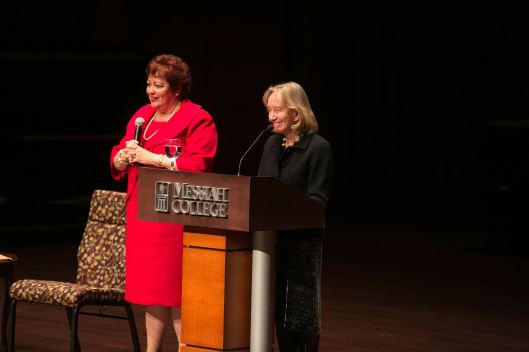The following post was written by senior Rachel Bauman, department work study and blog manager for the 2014-15 school year.

Doris Kearns Goodwin with college president Kim Phipps. (Image courtesy of Messiah College.)
On October 30, I had the pleasure of being in a sold-out Parmer Hall, hearing renowned historian and Pulitzer Prize-winning author Doris Kearns Goodwin speak on her newest book, The Bully Pulpit: Theodore Roosevelt, William Howard Taft, and the Golden Age of Journalism. Goodwin is perhaps best known as the author of Team of Rivals: The Political Genius of Abraham Lincoln, which was adapted into the critically-acclaimed 2012 film Lincoln, directed by Steven Spielberg.
Goodwin admitted that her interest in strong leadership has framed her studies thus far; she has written extensively about some of the most dynamic presidents in American history, including FDR, Lincoln, and now Theodore Roosevelt. Some of our best presidents showed their strength in times of national crisis. But, Goodwin noted, there were no large-scale crises during the presidency of Theodore Roosevelt. What then contributed to TR’s leadership? She outlined ten characteristics that defined leadership to her, including conquering the self, resolutely addressing the problems of the time, and taking criticism “with grace.” TR conquered his sickly childhood through rigorous self-training. As President, he took steps to address the social crises that came with the industrial revolution, like poor working conditions, unsanitary food production, and monopolistic business practices. And TR was well-known for his rapport with journalists of every persuasion; he even invited some of his fiercest critics for meals at the White House!
“He adored being president,” said Goodwin of TR. He was a master communicator and traveled around the country more than any previous president, talking simply and persuasively to the American people about citizenship and the importance of virtue. Because he had already been in office for seven and a half years following the assassination of William McKinley, he decided not to run in 1908. He put his full support behind his Secretary of War and close friend William Howard Taft, who he was sure would carry out his progressive policies. Unfortunately, noted Goodwin, “not everyone who is number two is meant to be number one,” and Taft’s kindly personality was not well-suited for an effective presidency. This led to a rupture in Taft and TR’s relationship, reaching its peak during the 1912 election season when TR, who failed to secure the nomination of the Republican Party, ran under the Bull Moose Party of his own creation. The Republican votes were split between Taft and Teddy, and Democrat Woodrow Wilson won the election. Before Roosevelt’s death in 1919, however, he and Taft were fully reconciled, which was a joyous occasion for both of them.
Interspersed throughout Goodwin’s summary and discussion of her book were lively stories about her time working with Lyndon Johnson when he was President and later as he wrote his memoirs at his Texas ranch. Johnson opened up to Goodwin, whom he hired even after she wrote a condemnatory article about his handling of the Vietnam War, about his concerns that the war would tarnish his reputation. She recounted that LBJ was always working—even while floating in his pool, and that his only real solace from the stresses of the presidency was found in the support of his wife, Lady Bird. Goodwin also discussed her childhood love of storytelling, which led her to become the “narrative historian” she is today, and her experience working with Steven Spielberg and Daniel Day-Lewis on Lincoln. Goodwin also noted that Spielberg has already purchased the rights to her new book on TR and Taft, which is sure to be impressive.
The most memorable part of the evening for me was during the question and answer session, when Goodwin considered whether or not her great love for the historical figures she studies clouds her objective judgment about them. She stated that her research always begins with respect and admiration of some kind, and a desire to like the person she’s researching—after all, she has to “live with them,” as she calls it, for years. But this affection doesn’t mean she won’t be occasionally disappointed. Her admiration for FDR, for example, is tarnished by his call for internment of Japanese-Americans during WWII. But, Goodwin noted, it is important to balance the strengths and failures of such figures when analyzing their decision.
Goodwin’s message can easily apply to our current political context. We must remember that our leaders in government are indeed fallible human beings, with both strengths and lapses in judgment. Leadership is more than just getting it right all the time; it is a consistent pattern of principles mixed with pragmatism. It is an attempt to secure the most good for the most people, even if it requires self-denial. At the end of his life, Goodwin said, Theodore Roosevelt wanted to feel as though he had lived with integrity, doing his best with what he had been given. May our present and future political leaders strive to do the same.
